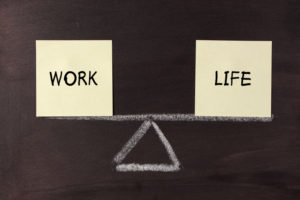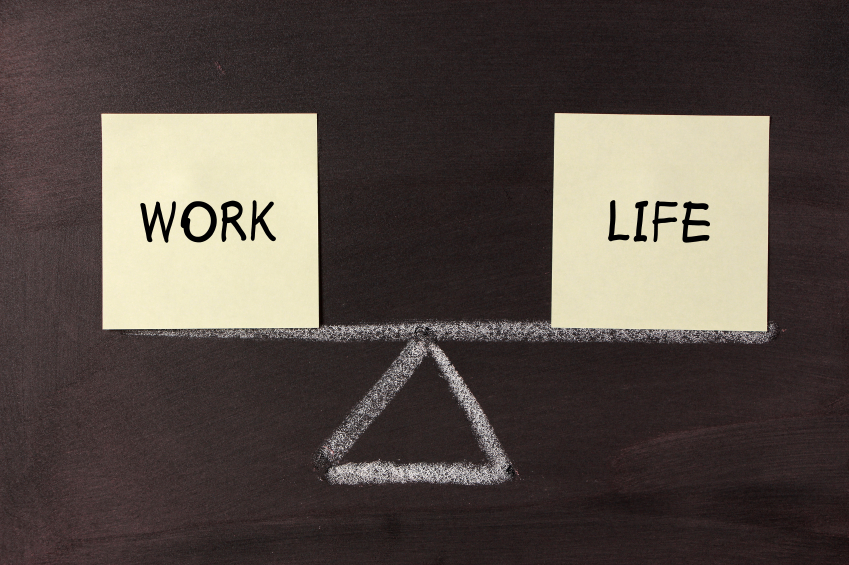Last updated on December 13th, 2017
 |
VERSUS:  |
One of the most commonly tossed around ideas when it comes to achieving greater well-being and happiness is the elusive pursuit of “work-life balance”, a term that yields nearly one million results on Google in less than a second. Yet in my experience as a psychologist and a coach, I have found that work-life balance is not a healthy goal. In fact, I have come to believe in and to help people design what I call work-life harmony. Here are some reasons why harmony is better than balance and some strategies for creating more of it.
Work-life balance is a myth. Even worse, it’s a destructive myth that puts unnecessary pressure on people and encourages people to compare themselves to others. Balance implies perfection. Even the well-known “balance wheel of life” that divides your life into a pie chart implies that if there are gradations in your level of fulfillment in various aspects of life, your “wheel” will be jagged and your life will be a bumpy ride. People also take pride both in being “busier” than everyone else and also being better at the work-life balance equation. An alternative to this quest for perfection is to cultivate (love that word) “work-life harmony”.
Harmony beats balance every time. One of the amazing things about human beings is our ability to be creative, including creating beautiful music. Songs can be simple or complex and are endless in their uniqueness from the Beatles’ “Let It Be” to “Beethoven’s 9th”. Harmony also implies a pleasant blend of notes or tones, but sometimes songs have some dissonance in them as well. Moreover, we have unique tastes in our music preferences—just look at anyone’s iTunes playlists!
So, sometimes life also is more complicated with some dissonance—at certain stages of life or when you have a new baby, are perhaps running a start up company, or even caring for an ill family member. At these time your life won’t be “balanced”, but your life can have some harmony to it. When I did a workshop at a Leadership Retreat on Work-Life Harmony, the two days prior I had been with my husband who had emergency surgery and had been intubated and on morphine (he is fine now); while with him at the hospital, taking care of my children at home, and preparing for my workshop, I was not in balance, but I was absolutely in harmony (see below for the how-to part).
Moreover, “one size does not fit all”—your idea of harmony might be very different from mine. It depends greatly on one’s temperament and personality, the developmental stage of your life, and your core values and life purpose.
Finding YOUR own “sweet spot” with respect to work-life harmony is key. The sweet spot is considered the most effective spot from which to hit a ball with a bat or a racket—what’s the most effective way to use your own unique talents and gifts, your core values to create a life that fits your definition of success? That is what you need to figure out.
Three tips to creating work-life harmony:
1) Identify your core values—Make a list of values, whittle them down to 3-5, and consider how these values affect every decision you make every day. Making choices in life is easier when you know and are mindful of your core values. One place to discover your top five character strengths is authentichappiness.com, a website from the University of Pennsylvania that identifies your top five core character strengths. People who use these signature strengths every day are happier and more fulfilled in their professional and personal lives.
2) Know your personality–I recommend you do this right and hire an experienced coach who can help you identify the best assessments for you. But whether you use the Meyers-Briggs, the PeopleMap, the DiSC or some other tool, thinking about who you are is key. For instance, what is your level of reactivity to stress, your preferred activity level, your needs for closeness, your degree of introversion or extraversion, your need for novelty, your use of intuition or need to make lists? For example, how much alone time do you need? How much of a juggler are you? Do you need a lot of boundaries between home and work? Are you laid back or super organized? There is not one set of work-life harmony strategies for everyone! It is vital that you figure out what works for you!
3) Get the data–Apply basic scientific principles for well being and happiness to create and sustain work-life harmony, no matter how you design your life. For instance, we know that well-being generally involves optimism and positive mood, self-compassion (lose the guilt!), positive social relationships with others, work that is meaningful and personal activities that you enjoy (whether that is reading, gardening, cooking, doing triathlons, church, bunko).
No one else knows whether it is better for you to exercise in the morning, work from home, clean your garage on the weekend, etc. You get the point. It is just that you have to mindfully, consciously design your life so that it works for you! Find your own “sweet spot” and let me know how it goes!
Photo credits: Istock.com
Follow me on twitter at @insightbusworks.com.







0 Comments